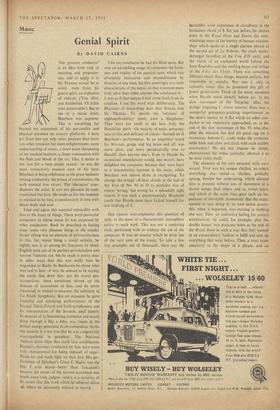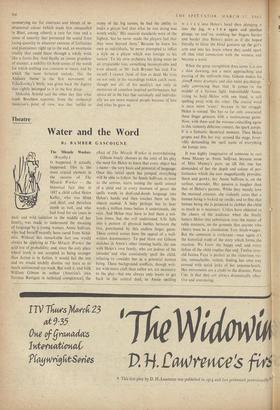Music
Genial Spirit
By DAVID CAIRNS 'Tim greatest conductor' is an idea both void of meaning and preposter- ous, and to apply it to Sir Thomas would be to invite, even from his genial spirit, an explosion of ridicule (You idiot, you fustilerian, I'll tickle your catastrophe'). But to me as a music lover, Beecham was supreme. This is something far beyond my enjoyment of his personality and physical presence on concert platforms. I have got from him not only more pleasure than from any other musician but more enlightenment, more understanding of music, a more acute sharpening of my musical instincts, a closer communion with the flesh and blood of the art. This, it seems to me, was for a very, simple reason : he was the most instinctively musical man of his time. Beecham is being celebrated as the great hedonist among conductors, the prince of connoisseurs, the arch musical bon vivant. The 'character' over- shadows the artist. It was not pleasure he com- municated but love. He made us for the moment as musical as he was, as passionately in love with music body and soul.
Time and again this essential musicality took him to the heart of things. There were particular composers in whose music he was surpassed by other conductors. Bach he described as having done 'some very pleasant things in the smaller forms' (there was an element of provocativeness in this, for, music being a social activity, he rightly saw it as among his functions to shock English taste out of its puritan provincialism and narrow Teutonic rut; but he made it pretty clear in other ways that this was really how he responded to Bach). In Beethoven he chose what was real to him--it was, he seemed to be saying.
the music that drew him, not the moral pre- occupations; these sometimes stirred up the demons of iconoclasm in him, and he never measured, or wished to measure, the sublimity of the Ninth Symphony. But on occasion he gave beautiful and satisfying performances of the Second, Third, Fourth and Sixth symphonies; and his interpretation of the Seventh, until latterly he wearied of its hammering insistence and would drive through it like a Jehu. was titanic in the primal energy generated from tremendous rhyth- mic tension. It is not true that he was congenitally unsympathetic to grandeur. The National Anthem alone blew that myth into annihilation.
Handers choruses conducted by him were more truly monumental for being reduced of super- fluous fat and made light on their feet. His per formance of Schubert's Great C Major was the best I ever heard--better than Toscanini's because the tempo of the second movement was much more truly judged--and it is a curiosity of Ilk, career that this work which he admired above all others he adamantly refused to record. Like any conductor he had his blind spots. But over an astonishing range of composers the fresh- ness and vitality of his musical taste, which was absolutely instinctive and unconditioned by theories of any kind, led him unerringly to a style characteristic of the music, so that it seemed more truly alive than when anyone else conducted it— it was as if that instant it had come fresh from its creation. I use the word style deliberately. The Pharisees of musicology beat their breasts over Sir Thomas. To purists his 'versions' of eighteenth-century music were a blasphemy. They were too small to see how truly the Handelian spirit—the majesty of scale, sensuous- ness of line and delicacy of colour—burned on in Beecham's performance. In an imperfect world his Messiah. gongs and big brass and all, was more alive, and more paradoxically true to Handel, than anyone else's. Even in Haydn his occasional emendations would, one swears, have delighted the composer, because they were loyal to a characteristic humour in his music which Beecham was almost alone in recognising. To change the strings' off-beat chords at the end of the Trio of No. 93 in D to pizzicato was of course 'wrong,' but wrong for a splendidly right reason; it was such a quintessentially Haydnish touch that Haydn- must have kicked himself for not thinking of it.
One cannot over-emphasise this question of style, in the sense of a characteristic atmosphere native to each work. This was not a conjuring trick, performed with or without the aid of the composer. It was an essence which he drew out of the very core of the music. To take a few tiny examples out of thousands, there was the incredibly vivid experience of cloudburst in the fortissimo chord of E flat just before the chorus entry in the Royal Hunt and Storm, the over- whelming sense of the brevity of human relation- ships which spoke in a single clarinet phrase in the second act of La Boheme, the cruel, exotic. deranged brooding of the Coq d'Or suite, and the vision of an enchanted world behind the horn flourishes and the swirling harps and strings of the Valle des Flews. There was something different about these things, beyond analysis, but impossible to mistake. Nor was it only in romantic music that he possessed this gift of • poetic penetration. Think of the many moments when Haydn stood directly before us: in the slow movement of the 'Surprise,' after the strings' imposing C minor octaves, there was a wonderful pomposity-pricking impertinence in the oboe's answer in A flat which no other con- ductor in my experience approached; or, at the end of the slow movement of No. 93, who else, after the bassoon has laid his great egg on a monstrous bottom C, could make the orchestra settle back and crow and cluck with such audible satisfaction? He did not impose—he simply characterised the music correctly, allowed it to be most richly itself.
The elements of his own personal style were several. First was his unique rhythm, on which everything else rested—a rhythm, perfectly sprung, flexible but undeviating, which allowed him to proceed without loss of movement at a slower tempo than others and so reveal more. and which at the same time gave such an im- pression of inevitable momentum that the music seemed to spin along by its own motor power; this, when it happened, was exciting as nothing else was. Then, an instinctive feeling for correct accentuation; he could, for example, play the double basses' two pizzicato notes at the end of the Royal Mint in such a way that they seemed in an extraordinary fashion to fulfil and sum up everything that went before. Then, a most acute sensitivit\ to the shape of a phrase, and an unwearying ear for contrasts and blends of in- strumental colour (which made him unequalled in Bizet, among others); a care for tone and a sense of sonority that prevented the sound from losing quantity in whatever extreme of fortissimo and pianissimo; right up to the end, an enormous vitality that could blaze through a whole work 'like a forest fire. And finally an innate grandeur of manner, a nobility (in both senses of the word) for which nothing was common or mean, and by which the most battered melody, like the Andante theme in the first movement of Tchaikovsky's Sixth, was given back the dignity that rightly belonged to it in the first place.
Malcolm Arnold said the other day that what made Beecham supreme, from the orchestral musician's point of view. was that 'unlike so many of the big names, he had the ability to make a player feel that what he was doing was worth while,' His musical standards were of the highest, but he never made the players feel that they were beyond them.' Because he knew his men as individuals, 'he never attempted to inflict a style on a player which was foreign to his nature.' To his own orchestra his dying must be an irreparable loss, something inconceivable and even absurd, as Mr. Jack Brymer has said. For myself, I cannot think of him as dead. He lives on not only in his recordings (which catch most. though not all, of his quality), not only in memories of countless inspired performances, but above all in the fact that nationally and individu- ally we are more musical people because of him and what he gave us.







































 Previous page
Previous page